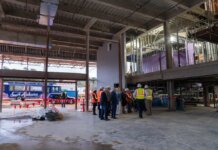
By paying attention to every detail, down to the last nut and bolt, Hoar Construction has been successfully building for 85 years.
“When you do that, it’s kind of like the old saying, ‘If you watch your pennies, your dollars will take care of themselves,’” says Hoar CEO Rob Burton.
Adopting that detail-oriented mindset has helped the general contractor grow to 10 offices nationwide and around $1.5 billion annually in managed projects. Hoar also successfully spun off HPM, its program management division, in 2012.
Founded in Birmingham, Hoar originally focused on building churches, Burton says. It now serves sectors including K-12 and higher education, health care, retail/mixed use, multifamily residential, office, government, industrial, hospitality and entertainment, and mission-critical. President Turner Burton leads more than 800 employees at Hoar.
Whether it’s a hospital expansion or a new school, Hoar’s focus on details includes carefully vetting subcontractors, explains CEO Burton.

“A mistake in picking the wrong trade partner can cost an awful lot of money for a general contractor,” Burton says. “So, we put a great deal of emphasis on making sure that our trade partners [are] treated fairly, but first vetted properly, so we know their capabilities and that they’re the right fit for the job. They are vital to the success of any general contractor.”
When asked about specific building challenges encountered by Hoar, Burton acknowledges that every construction job has problems. Hoar takes those lessons learned into consideration to make improvements on future projects, aiming to get better each day.
“We talk a lot about one of our core values — ‘the relentless pursuit of improvement.’ We do very deep reviews of every job when we’re finished,” he explains.
Hoar is one of the top 10 health care builders in the country, according to Burton. One of its newer projects is the replacement of Spain Rehabilitation Center at the University of Alabama at Birmingham. Ground was broken in May 2022, and the $128 million building is now in the final stages of construction, Burton says.
The 11-story building occupies nearly 350,000 square feet on Seventh Avenue South. It includes seven floors of hospital space and four floors of parking deck, with a connection to an existing pedestrian walkway. The building is designed for 78 rehabilitation beds and 28 acute-care beds, UAB notes.
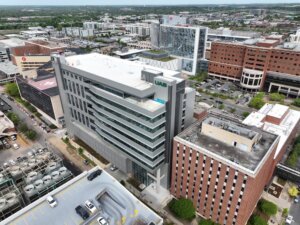
“[The building] has been a very, very impactful project for Birmingham and UAB,” Burton says, noting that Hoar has built multiple projects on UAB’s campus over the years.
Another current Hoar project is Auburn University’s new STEM and Agriculture Sciences Complex. Construction began in January 2024, with completion expected by summer 2026.
Hoar is managing construction of the 285,000-square-foot project, which will cost $184 million. “It is the largest contract I think Auburn had ever awarded at the time,” Burton says. The complex will be located along PO Davis Drive, where AU’s Hill Residence Halls were formerly located.
The AU complex’s three buildings will include high-tech teaching labs, research labs, a teaching garden and communal student areas. The labs and basement area are designed to hold aquatic animals and insects for study.
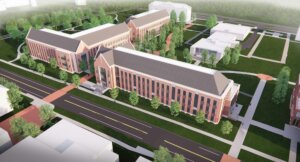
The complex will centralize several departments from the College of Sciences and Mathematics and College of Agriculture to one location, from biological sciences to crop, soils and environmental sciences, plus others.
The job is one of more than 20 different college campus projects currently ongoing or upcoming for Hoar, Burton notes, spanning across Alabama, Texas, Tennessee and Virginia.
Among them are projects at Spring Hill College in Mobile (a new Health and Science Innovation Center) and Alabama A&M University in Huntsville. The latter will be a new science building focused on significantly increasing the university’s instructional classroom and laboratory STEM capacity in biology, chemistry and physics, according to Alabama A&M’s website.
Spinning off HPM
After walking through Birmingham-area schools in 1997, Hoar leadership saw that clients needed support beyond the construction process, Burton says. Hoar created a division focused on program management.
“We recognized that as a construction company, a lot of our clients are not as well versed in how construction and design works, and the responsibilities of the owner,” Burton explains.
The new division quickly grew. In 2012 it became a separate company, HPM, under the Hoar Holdings family of companies. It has its own clients apart from Hoar Construction, Burton notes.
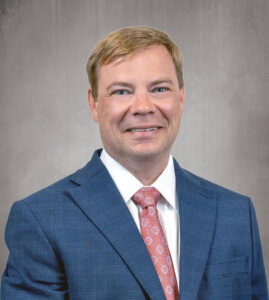
HPM’s program managers operate on behalf of owners, facilitating the entire construction program and process. “This also allows [owners] to keep their overhead down [because] they don’t have to have permanent, full-time experts on their staff,” Burton says. “[HPM is] able to come and go as an institution needs us. It’s far more efficient.”
Led by President Ryan Austin, HPM is headquartered in Birmingham, with eight offices nationwide. More than 200 HPM employees serve a variety of sectors including municipalities, aerospace/aviation, manufacturing/industrial, K-12 schools and higher education.
HPM alone is managing around $2 billion a year in construction projects, according to Burton.
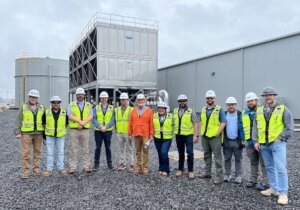
He notes some of the Alabama-based signature clients for HPM:
- The University of Alabama (one of HPM’s first clients, which has grown into a 20-plus year relationship)
- Airbus, which manufactures A220 and A320 family commercial aircraft in Mobile, creating significant economic impact for the state
- Regions, a partnership which began in Alabama before expanding nationwide
Construction Industry Challenges
Hoar, like others in the industry today, sees recruitment as one of its greatest challenges. “Recruiting the right people that fit our culture and think the way we think — that is huge,” says Burton. “We do a great job of [ensuring] people know what kind of careers we can provide them here, and the ability to grow in many different industries and sectors.”
A lot of Hoar’s focus is on training and developing its employees, including using online learning developed internally. Part of that effort, Burton explains, is using artificial intelligence to gather job information in one database. This data can include lessons learned on a job, related files and documents, and specific systems or equipment used on that job.
The AI project supports lean principles used in construction, Burton notes. “This is a way to eliminate a waste of time for our employees — to make sure that it’s easy to find the systems and the methods of how to build, but also how to do it faster,” he explains.
Proud Papa?
When asked to choose a Hoar project he’s particularly proud of, Burton is reluctant. It’s like naming the child you are most proud of, he notes. Better to keep quiet. But …
“We love them all, and we’re grateful for every client. It’s hard to win a client, and you have to do a great job to keep a client. But sure, Children’s Hospital [in Birmingham] always stands out. It’s iconic looking on the skyline, a beautiful building. But the impact it has on children’s lives has always been special to me.”
Nancy Randall is a Tuscaloosa-based freelance contributor to Business Alabama.
This article appears in the September 2025 issue of Business Alabama.



